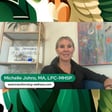
S3/Ep 5: America's Hunger Crisis - Real Solutions Beyond the Food Bank
Recent SNAP benefit disruptions have exposed how fragile our food security safety net really is.
Food insecurity affects over 44 million Americans, with Texas ranking #1 in the nation. But hunger isn't just about a lack of food—it's about time poverty, housing instability, healthcare gaps, limited education, and blocked economic opportunity. When you're working multiple jobs to survive, you don't have time to cook nutritious meals, attend job training, or advocate for better wages.
Tammy Johnson, Executive Director and Founder of Empowering the Masses, reveals why traditional food banks provide temporary relief but can't break the cycle of poverty.
Learn what food insecurity looks like on the ground, why holistic approaches work, and what you can do right now.



















